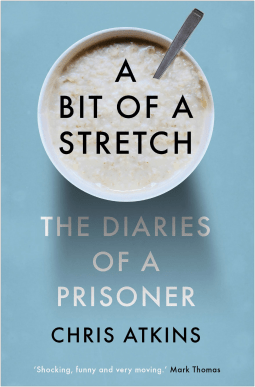I’ve just read A Bit of a Stretch by Chris Atkins. A successful journalist and documentary filmmaker, he was sentenced to 5 years in prison for a tax fraud he became involved in when looking for ways to finance a project. As someone used to documenting events he kept a detailed diary about his time in Wandsworth. It’s an interesting look at what life “inside” is like. While the tabloid headlines continue to scream about “lags” living it up at the tax payer’s expense in “holiday camp” prisons, Atkins calmly pulls back the curtain and exposes the reality of how this country treats its prisoners.
Nothing I read was news to me because I work in a prison library in an open prison (which Atkins describes as being “like the Ritz in comparison”) and often prisoners tell me their stories; what they did, which prison they have been in and the things they’ve seen. Atkins worked the system as best he could, acknowledging that as a white, middle class, well-educated man he had many advantages most prisoners don’t. He quickly got himself on the “best” wing. He volunteered as a Listener – a prisoner trained by the Samaritans to provide assistance to other prisoners in crisis. He met with many desperate people, most of whom have mental health issues which make them incapable of the kind of conformity the prison regime demands. They are punished rather than treated. Men are locked up 23 hours a day. The ideal of rehabilitation via education, health and work followed by appropriate resettlement is unavailable. Teachers stand in empty classrooms because there aren’t enough officers to unlock the men. Healthcare appointments are missed for the same reason.
I smiled at the publishing blurb which asks “Where can a tin of tuna buy you clean clothes?” One evening at work a prisoner asked me to photocopy something for him and to my surprise offered me a tin of tuna as an incentive. It was only when I mentioned it to one of the men who worked with me in the library I discovered it’s prison currency. It’s that familiarity with the narrative that made this book perhaps slightly less engaging to me as so much of it was like conversations I regularly have, however, I think anyone curious about what it’s like to be in prison will find this book fascinating. It’s important stuff too. Atkins balances darkness and desperation with much-needed humour through anecdotes and encounters with prisoners and officers. There’s camaraderie too; that essential and often unlikely bond between people in similar situations. And also, the heartbreak of being away from his young son. Every time someone is imprisoned there are other people who suffer; family and friends – the impact on children is huge.
Prison reform is a tough subject because the public is resistant to spending money on those who commit crime. Why make life easier for people who have done the wrong thing? It comes way down on the wish list when you consider how all of our services are so stretched and underfunded. Who would choose funding prisons over education, healthcare, adult services etc? It’s no election winner. Atkins suggests most reasonable people agree everyone should be treated with at least minimum standards of decency and care, but for the throw away the key brigade he employs unarguable statistics: “Britain has the worst reoffending rate in Europe with 48% of ex-prisoners being reconvicted within one year of release. The cost of reoffending alone is estimated at £15 billion, more than three times the entire prison budget.” Atkins ends the book with his suggestions for improvement which are pretty compelling. For more information please look at the Prison Reform Trust which does sterling work in this field.
I do want to end by saying I have come across many people who work in prisons who are absolutely motivated to support and rehabilitate people so they leave prison in a better position than they went in. Breaking the cycle of offending is what we all want, surely?

